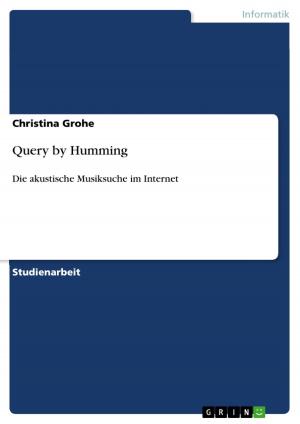'Old Antiquities and New Features'. Melville's Style and Literary Influences in 'Moby Dick'
Fiction & Literature, Literary Theory & Criticism, British| Author: | Lindsey McIntosh | ISBN: | 9783668044548 |
| Publisher: | GRIN Verlag | Publication: | September 11, 2015 |
| Imprint: | GRIN Verlag | Language: | English |
| Author: | Lindsey McIntosh |
| ISBN: | 9783668044548 |
| Publisher: | GRIN Verlag |
| Publication: | September 11, 2015 |
| Imprint: | GRIN Verlag |
| Language: | English |
Essay from the year 2014 in the subject English - Literature, Works, grade: 1st, University of Strathclyde, course: English Literature, language: English, abstract: The ambition of this short literary essay is two-fold. Firstly, it aims to briefly explore some of the literary sources used to shape and create Herman Melville's 1851 novel, Moby Dick. A multitude of literary sources could be suggested to influence Melville's work but the principle works focused upon in this discussion are William Shakespeare's tragic play Macbeth and John Milton's epic poem 'Paradise Lost'. By drawing upon linguistic and symbolic parallels present between Moby Dick and these two works, the essay aims to show how Melville alludes to classical sources to create a refreshingly modern piece of work. The second goal of the essay is to explore in greater detail Melville's use of language in 'Moby Dick.' Several critics have noted in past discussion that Moby Dick's triumph lies embedded in its sophisticated verse, with Richard Brodhead crediting a large portion of the novel's greatness to be owed to the author's powerful command on the English language. With this view in mind, the essay examines some of Melville's own linguistic accomplishments in order to decide whether 'more persistently than anything else - more persistently than it is the heroic, or philosophic, or whatever - Moby-Dick is a book in love with language' (Brodhead, 1986).
Essay from the year 2014 in the subject English - Literature, Works, grade: 1st, University of Strathclyde, course: English Literature, language: English, abstract: The ambition of this short literary essay is two-fold. Firstly, it aims to briefly explore some of the literary sources used to shape and create Herman Melville's 1851 novel, Moby Dick. A multitude of literary sources could be suggested to influence Melville's work but the principle works focused upon in this discussion are William Shakespeare's tragic play Macbeth and John Milton's epic poem 'Paradise Lost'. By drawing upon linguistic and symbolic parallels present between Moby Dick and these two works, the essay aims to show how Melville alludes to classical sources to create a refreshingly modern piece of work. The second goal of the essay is to explore in greater detail Melville's use of language in 'Moby Dick.' Several critics have noted in past discussion that Moby Dick's triumph lies embedded in its sophisticated verse, with Richard Brodhead crediting a large portion of the novel's greatness to be owed to the author's powerful command on the English language. With this view in mind, the essay examines some of Melville's own linguistic accomplishments in order to decide whether 'more persistently than anything else - more persistently than it is the heroic, or philosophic, or whatever - Moby-Dick is a book in love with language' (Brodhead, 1986).















